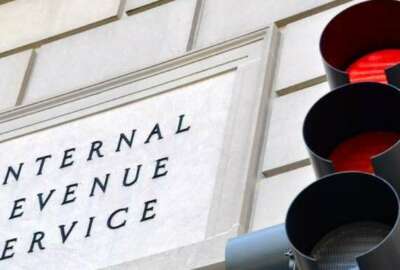
Grassley: Whistleblowers ‘as welcome as a skunk at a picnic’ at agencies. But what about the White House?
Despite President Donald Trump's history of tweeting about "leakers" in government, Sen. Chuck Grassley (R-Iowa) remains optimistic that the president may take him...
Best listening experience is on Chrome, Firefox or Safari. Subscribe to Federal Drive’s daily audio interviews on Apple Podcasts or PodcastOne.
Members of Congress and inspectors general have called federal employee whistleblowers the “eyes and ears” of the oversight community.
But at the agencies where they report wrongdoing, “Whistleblowers are about as welcome as a skunk at a picnic,” Sen. Chuck Grassley (R-Iowa) said Monday on Capitol Hill during a National Whistleblower Day event.
In many cases, whistleblowers risk both their jobs and their reputations when they come forward with reports of misconduct. Seeking to recognize this fact, Grassley earlier in the day tweeted to President Donald Trump, urging him to hold a formal ceremony in the White House Rose Garden honoring whistleblowers.
“I’ve been asking every president since Ronald Reagan to hold a Rose Garden ceremony to honor these brave men and women. Not a single one of them has taken me up on it,” said Grassley, a founding member of the Whistleblower Protection Caucus.
But despite Trump’s history of tweeting about “leakers” in government, he remains optimistic that the president may take him up on his offer.
2day is national whistleblower appreciation day The way to drain the swamp is for the president to honor whistleblowers. whistleblowers know where the skeletons are in govt why not have a rose garden ceremony honoring whistleblowers? @realDonaldTrump
— ChuckGrassley (@ChuckGrassley) July 30, 2018
“I think it’s about time that the president joined the rest of us here in saying thank you,” Grassley said. “This president ought to be very willing to do it, because he has come to Washington to make changes. He wants to drain the swamp.”
The White House did not respond to requests for comment.
Dan Meyer, former director for whistleblowing and transparency in the Office of the Intelligence Community’s Inspector General, echoed Grassley’s calls for the president to honor whistleblowers in government. But he also said he understands why the White House hasn’t called him to the Rose Garden just yet.
“I do think the executive branch — and it’s not a partisan observation because it’s both Democrats and Republicans — has a challenge with such an event because let’s face it, most of the whistleblowing is about activities in the executive branch,” Meyer said.
Meyer was fired in March under murky circumstances. Prior to his removal, Meyer was barred from speaking with intelligence community whistleblowers, despite that being a major aspect of his job.
In the absence of presidential plaudits, Grassley has helped pass every recent piece of whistleblower protection.
In 1986, he introduced amendments to the False Claims Act that allow whistleblowers to share in the government’s recovery of funds resulting from fraud investigations.
Last year, the Justice Department recovered more than $3.7 billion under the False Claims Act. Since Grassley’s amendments took effect, the government has recovered more than $56 billion from fraudsters.
Citing these numbers, Grassley said whistleblowers deserve a cut of the money they helped to recover.
“It’s only fair, because none of these proceeds would have been collected without the whistleblowers’ help,” Grassley said. “The reward programs are not about what whistleblowers gain by blowing the whistle. They’re about everything that whistleblowers stand to lose. The truth is that whistleblowers are so ostracized and reviled they suffer retaliation for speaking up.”
Earlier this month, Grassley introduced provisions to the Taxpayer First Act that clarify what funds fall into the pot of money from which IRS whistleblowers get their share.
The bill also clarifies that the IRS can share information with whistleblowers to advance investigations, and would protect whistleblowers from agency retaliation for the first time.
Grassley, who also spoke at a recent event honoring the upcoming 40th anniversary of the Inspector General Act, said IGs rely on whistleblowers to provide tips about misconduct and wasteful spending.
“Going after waste, fraud and abuse without whistleblowers is about as useful as harvesting an acre of corn … with a rusty pair of scissors,” Grassley said.
Justice IG: Whistleblowers play essential role in oversight
While DoJ’s Office of the Inspector General stands out as one of the largest IG offices in the federal government, Michael Horowitz, the agency’s inspector general, and the chairman of the Council of Inspectors General on Integrity and Efficiency (CIGIE), said whistleblowers play an essential role in oversight of the agency’s 100,000 employee workforce.
“To do that job most effectively, we need the employees at the Justice Department to be willing to come in and speak to us. We need employees of Justice Department contract recipients and grantees to be able to come in to speak to us. That’s how oversight gets done effectively. That’s how waste, fraud, abuse and mismanagement is rooted out,” Horowitz said.
But Jane Turner, a former special agent with the FBI, said whistleblowers often face lengthy and expensive legal battles.
After exposing crime-scene theft in the aftermath of Sept. 11, Turner spent 10 years fighting the FBI in court. But despite winning her lawsuit against the agency, she has spent more than 15 years fighting the FBI for her retirement benefits.
“We are thrown into an ocean where we can see no land, where we can see no sun, no stars. The only compass a whistleblower possesses is our integrity and our bravery. But we face true north, and we stay on a tortuous journey,” Turner said.
Meyer said federal employees, under recent executive orders, have an obligation to act as whistleblowers when they see misconduct.
“It’s required to blow the whistle as a federal employee,” Meyer said. “It’s not optional, it’s not discretionary.”
As a result, Meyer said agencies should recognize whistleblowers during their annual performance evaluations.
“We should get to a point where federal employees can actually put on their performance evaluations how many times they blew the whistle in the last reporting period,” he said. “Your supervisor or manager should be able to look at your record.”
Linda Tripp, a former Pentagon public affairs official who played a key role in the Bill Clinton scandal that ultimately led to impeachment hearings, said whistleblowers yield “enormous pressure,” but need more protection from retaliation.
“Too few of us are ever made whole again. It is virtually impossible to get your good name back. The vitriol, the attacks, the slander remain in the public domain and sort of color people’s thoughts forevermore. I’m not sure they ever really dissipate, regardless of what you say, or how loudly you say it,” Tripp said.
Copyright © 2024 Federal News Network. All rights reserved. This website is not intended for users located within the European Economic Area.
Jory Heckman is a reporter at Federal News Network covering U.S. Postal Service, IRS, big data and technology issues.
Follow @jheckmanWFED
Related Stories

Under Pruitt, EPA comms staff dismissed employees’ complaints as ‘faux outrage’




